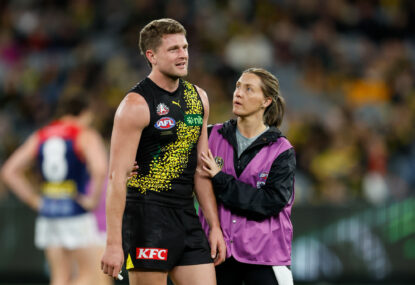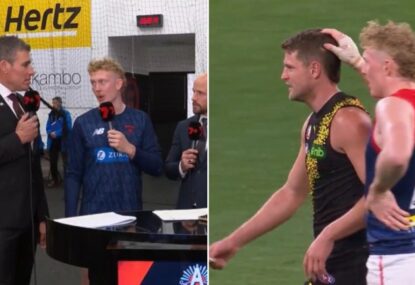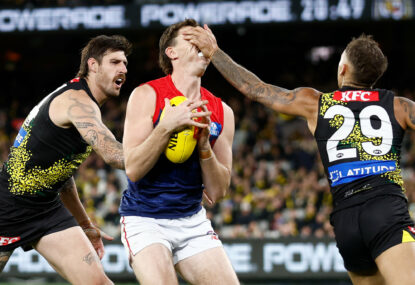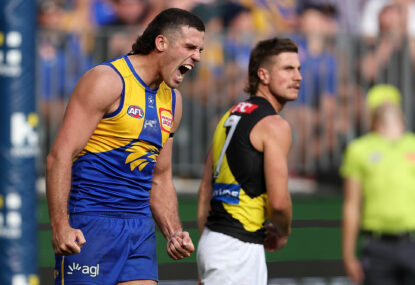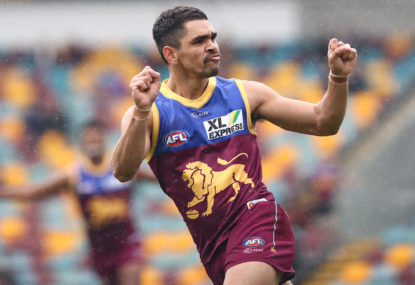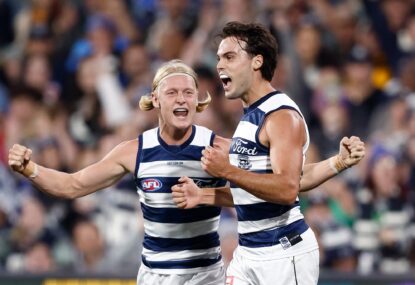Given the stakes, it’s not unreasonable to say Richmond’s effort in the first quarter on Friday night was the most abysmal 30 minutes of the season.
We expect skill errors, comical bloopers and stacks of goals piled on in quick time against West Coast and North Melbourne, so when it happens to them these days it’s never as jarring as it was from the Tigers as the Bulldogs ripped the match apart in 15 minutes of mayhem.
They’ve also never had as much to play for in 2023 as the Tigers, who with victory could have spent the night inside the eight and now face the reality that their season is likely shot, as much for their now morbid percentage as the four points they gave up.
It was utterly ghastly from a team which had only five days ago pushed Melbourne to the limit in a beautifully skilled Sunday afternoon classic – no doubt the five-day break played a heavy hand in the sloppiness of their execution, but there’s a point where a team plays so poorly that no excuse can justify it all.
So immensely enjoyable as it was for this Bulldogs fan to see the Tigers put on probably their worst quarter since that time Geelong began their era by dismantling them under the Docklands roof more than 16 years ago, it’s also hard to properly gauge how good the one team that leaves Friday night with finals hopes enhanced was.
For Andrew McQualter, it’s a hard lesson, and one that could well cost him dearly in his quest to take the Tigers’ top job on a full time basis next year.
There wasn’t much, to be fair, he could do about the myriad of yellow and black jumpers slipping over as if Marvel Stadium was an ice rink, or the numerous passes that sailed out on the full, or the countless undisciplined free kicks for late contact. But he was thoroughly out-coached by an opposite number in Luke Beveridge who has endured just about more criticism than anyone in the hot seat this year.
The first quarter stat line, bizarrely, tells you more about the game from the few things the Tigers won rather than all the areas in which they were hammered. Clearances, for one: against the year’s second-best stoppage team behind Brisbane, who had ripped Richmond a new one at the coalface only a month ago, they actually led the count 14-11 at quarter time, with a 7-4 centre bounce deficit that was far from as ghoulish as you’d expect with the scoreboard reading 57 to 15.
The problem, though, was in how McQualter was orchestrating it. Regularly pushing two forwards up to stoppages in the first half, it meant a major Tiger outnumber with the ball in dispute, but allowed the Dogs, still the weakest team in the competition at defending one-on-ones deep in the backline, to have two numbers behind the ball.
As a result of the extra numbers – and also the Tigers’ continued plan to get the ball forward by hook or by crook, it meant frequent hacked kicks forward from the likes of Tim Taranto and Dion Prestia right to the free Bulldogs, most often Laitham Vandermeer or Bailey Dale. And when they got it, it was all systems go.
So despite that learance dominance, the Tigers managed just nine inside 50s, plays regularly breaking down at half-forward or even earlier. The Dogs? 22.
As for pressure, the two sides were almost playing different sports such was the disparity. No side losing the disposal count by 39 should also have fewer than half the tackles – more than any turnover, laying just 11 tackles in a first quarter in which nine goals were conceded would have left McQualter within his rights to deliver a withering spray at the first break.
That’s without even mentioning the man-marking: the Dogs have been mediocre all year when it comes to their defensive 50 to inside 50 conversion percentage, and yet they scythed through the Tigers with dash and dare from the first bounce to the quarter time siren, encountering minimal resistance.
Watch the above, and you’ll notice three or four Tigers effectively running alongside the ball, powerless to effect a turnover where it was or set up in defensive 50 to diffuse the attacking kick when it came. Don’t ask me how, but the Dogs somehow had Rory Lobb totally loose inside 50 when the pass came for him, and under little enough pressure to mark and handpass to Jamarra Ugle-Hagan for the easiest of his five goals.
There’s no shame in getting outhunted by Tom Liberatore, or overpowered by Marcus Bontempelli, or even conceding a bag to Ugle-Hagan or Aaron Naughton. But the ease with which all the Dogs’ stars dominated Friday night from pillar to post was about as abject as it gets.
And then the most glaring stat of all: the Tigers put on so little pressure the Dogs had just nine first-quarter turnovers from their 110 disposals, or effectively one in 11. The Tigers, from 71 touches, had 19 of them. That’s worse than one in four.
They came in all shapes and sizes: botched kicks from even the usually reliable Jayden Short, ugly errors like Kamdyn McIntosh trying to rush through a behind and instead tapping it perfectly into the path of Ugle-Hagan, Liam Baker taking the advantage from a Noah Cumberland kick and booting it high and long into the path of the unpassable Jones.
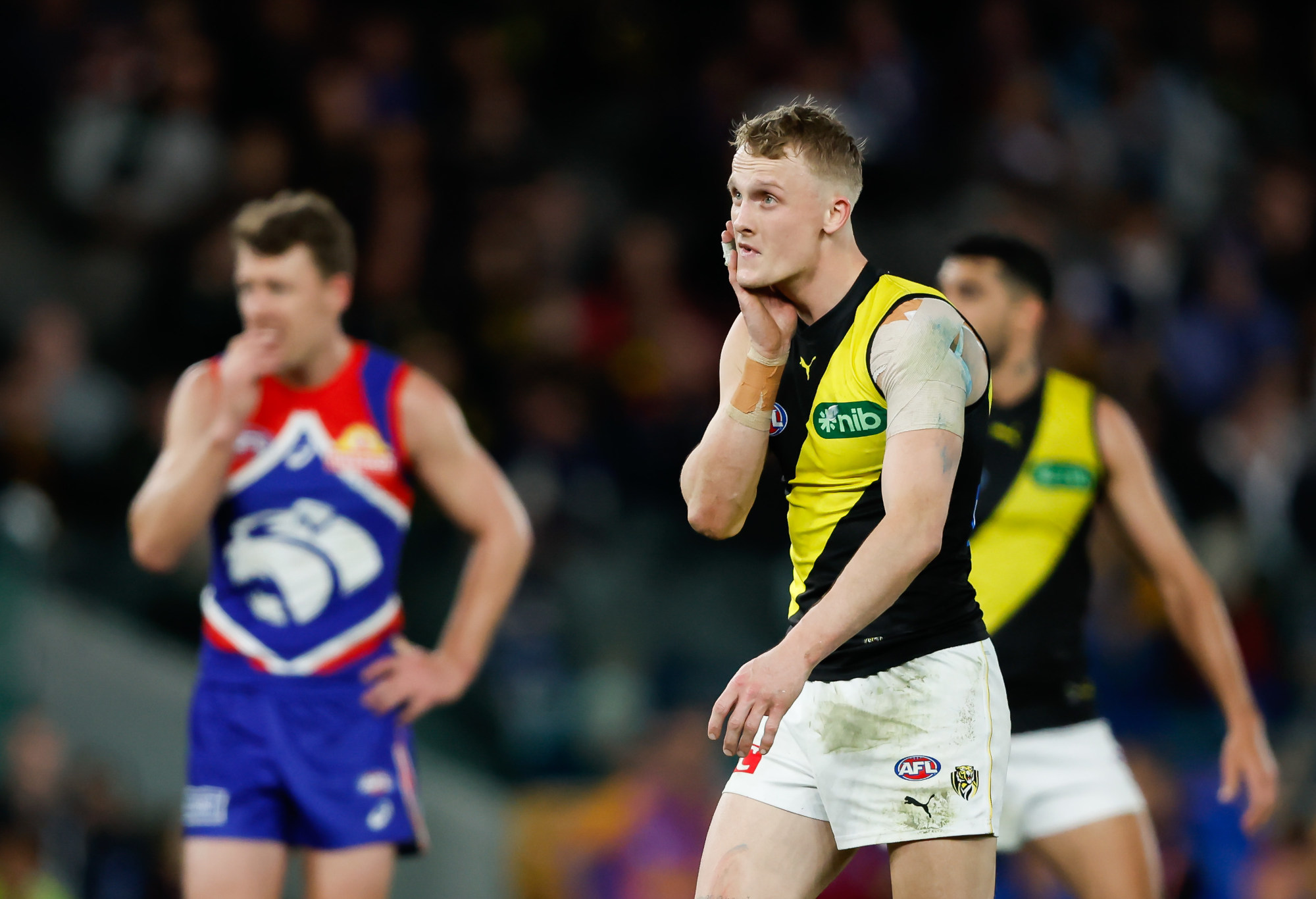
Noah Cumberland. (Photo by Dylan Burns/AFL Photos via Getty Images)
If the point of the exercise were to give praise when it was due, then it would be worth mentioning the Tigers were far better after quarter time. Around stoppages, they looked to slice through the front of stoppages with the pace of Shai Bolton, and Taranto’s kicks, where once they’d been aimless bombs, now largely came inside 50 on the bounce, creating a bit of uncertainty for the still-vulnerable Dogs backline which allowed a run of goals.
They continued to dominate clearances, began to break even out of the centre, and were able to move the ball with far more fluency and accuracy than at any stage of the first term. And aside from Noah Cumberland, who remained abysmal by hand and foot all night with error after error, the rest of the team’s kicking improved markedly.
Bu when you’re 44 points down at quarter time and have conceded nine first-term goals, there’s a) only up to go, and b) too late for it to be worth anything. All that did was suggest that the Tigers’ issue wasn’t the fatigue of a five-day break, but just a middling team putting together an all-time shocker, exacerbated by the absence of two key senior heads in Trent Cotchin and Dustin Martin who could at least have steadied the ship and shut the game down before it got totally out of hand.
Needing to both win their last three games, including an Adelaide Oval date with Port Adelaide, and hope their percentage doesn’t cost them a spot to Geelong or Sydney, it’s just about curtains for the Tigers’ season.
They’ve done well to overcome the double blow of losing their most crucial player in Tom Lynch, and of course Damien Hardwick, before the halfway point, but this was a golden chance to prove that they were more than that, and better than that.
Richmond will be better than what they dished up on Friday night – it’d be hard to get any worse. But even significant improvement, with a tough run home, will almost certainly be too little, too late.
And for all the good work he’s done as caretaker coach, the totality of the domination in the first quarter at Marvel Stadium, to a vulnerable opponent in an eight-point game, was abject enough – and will surely be costly enough – to make it very difficult for McQualter to make the job his own.






























































































